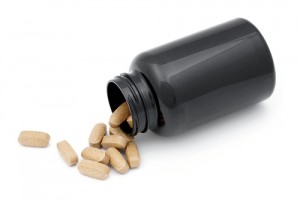Do the health related risks – specifically the cardiac risks – of testosterone replacement therapy necessitate a “black box” warning? Consumer rights advocacy group Public Citizen thinks so. This is a big deal because Public Citizen has been out in front on so many bad medicines over the last 30 years, long before the FDA figured it out.
Black box warning, the strongest warning that the FDA requires, signifying that medical studies indicate that a drug carries a significant risk of serious or even life-threatening adverse reactions. It might as well be the FDA shouting on the box. This underscores that appreciation for the risk of testosterone is increasing at lightning speed.
It was just last month that the FDA announced that it is investigating potential testosterone therapy risks. This was prompted after several studies suggested that the side effects of testosterone treatments may increase the risk of heart attacks, strokes, blood clots, and death. Pretty severe risks considering many men taking the medication aren’t even candidates for testosterone and cannot benefit from the drug.
The Problem
Low testosterone treatments may double the risk of a heart attack for young men with heart disease and for men 65 years of age and older, even those who have had no heart problems. That’s the problem in a nutshell. Additional concerns with the products include the increased risk of deep vein thrombosis (DVT) which can lead to life-threatening complications including pulmonary embolisms. DVT is where the body develops blood clots in the deep veins, most commonly in the legs. These blood clots can break off and travel through the body resulting in potentially life-threatening complications.
The following products are included with those that could be causing serious and fatal injuries:
- Androgel (Abbvie/Abbott)
- Androderm (Actavis)
- Axirom (Eli Lilly)
- Bio-T-Gel (BioSante and Teva)
- Delatestryl (Indevus)
- Depo-Testosterone (Pharmacia & Upjohn Company)
- Fortesta (Endo)
- Striant (Columbia Laboratories)
- Testim (Auxilum/GlaxoSmithKline)
- Testopel (Auxilium)
Despite this controversy, testosterone supplementation in the United States has increased substantially over the past several years. The increasing popularity of the medication is astronomical. Marketing directed toward the consumer preys on men’s concern of fatigue, decreased sexual virility, and other symptoms that are common with aging. If you are over 40 and don’t have these concerns, you are probably lying.
These companies play on our insecurities. Have you seen the commercials for AndroGel? They tell people to talk their doctors if they believe that they have “low T.” How would they know? Because they are aging?
Here’s the other problem. There is little clinical evidence to suggest that the drug will provide these kinds of benefits. Many health officials worry that testosterone replacement drugs are being prescribed for men with relatively normal levels of testosterone. According to the FDA, testosterone therapy was never approved for any treatment other than to treat men who have hypogonadism, a condition in which the male sex organs produce no or very low testosterone. That hasn’t seemed to slow down the population of those seeking prescription treatment. 2012 brought in sales of more than $1.9 billion, while over five million testosterone product prescriptions were filled last year in the U.S. alone.
What does the future hold?
Litigation, litigation, and more litigation. Even more so, I can only imagine now that drug manufacture, Endo Pharmaceuticals is ready to release a new long-acting testosterone injection known as Aveed. The FDA is set to decide whether to approve the product in the near future. Whether that drug will add additional concerns and lawsuits to those already filed or in the works is anyone’s guess, but I’d be willing to go out on a limb and say yes.
Testosterone Therapy and Bone Density
Testosterone therapy in males with low testosterone has been shown to improve bone density and quality. However, to fully understand its impact on fracture risk, larger and longer studies are needed, according to a new study.
In a subset of a larger study evaluating the cardiovascular safety of testosterone treatment in middle-aged and older males with low testosterone, we investigated its effect on fracture risk. Participants, aged 45 to 80 years with either preexisting cardiovascular disease or a high risk of developing it, displayed symptoms of low testosterone and had two morning testosterone readings below 300 ng per deciliter in fasting plasma. They were randomly assigned to use either testosterone or placebo gel daily. At each visit, they were asked about any fractures since their last visit, with medical records reviewed for confirmation.
Involving 5,204 participants (2,601 on testosterone and 2,603 on placebo) over a median of 3.19 years, we found that fractures occurred in 3.50% of the testosterone group and 2.46% of the placebo group, indicating a higher risk with testosterone treatment (hazard ratio, 1.43). This trend was consistent for all fracture types.
Ultimately, testosterone treatment in older men with low testosterone did not reduce the incidence of fractures compared to placebo, and in fact, showed a higher fracture rate.
What is the point of this? We still do not fully understand all of the risks and benefits of testosterone therapy (even now – updated in 2024 with this new study). When it comes up good, that is fantastic. But when it comes out badly…
Contact Us
If you, or a loved one, have taken a low testosterone supplement and experienced a heart attack, stroke, death, or any other severe side effects, you may be entitled to compensation. Contact our attorneys to find out more. We are currently reviewing potential lawsuits. If you any concerns, or believe you may have a case, call our attorneys at 1.800.553.8082 or reach out to us online here.
- Testosterone Lawsuit Filed| Blood Clot
- The Call for Large Scale Studies
- Could Testosterone Therapy Cause Heart Attacks?
 Lawsuit Information Center
Lawsuit Information Center


